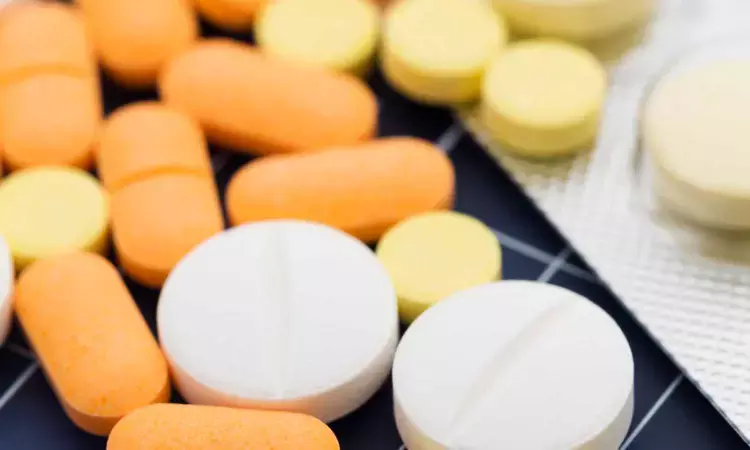- Home
- Medical news & Guidelines
- Anesthesiology
- Cardiology and CTVS
- Critical Care
- Dentistry
- Dermatology
- Diabetes and Endocrinology
- ENT
- Gastroenterology
- Medicine
- Nephrology
- Neurology
- Obstretics-Gynaecology
- Oncology
- Ophthalmology
- Orthopaedics
- Pediatrics-Neonatology
- Psychiatry
- Pulmonology
- Radiology
- Surgery
- Urology
- Laboratory Medicine
- Diet
- Nursing
- Paramedical
- Physiotherapy
- Health news
- Fact Check
- Bone Health Fact Check
- Brain Health Fact Check
- Cancer Related Fact Check
- Child Care Fact Check
- Dental and oral health fact check
- Diabetes and metabolic health fact check
- Diet and Nutrition Fact Check
- Eye and ENT Care Fact Check
- Fitness fact check
- Gut health fact check
- Heart health fact check
- Kidney health fact check
- Medical education fact check
- Men's health fact check
- Respiratory fact check
- Skin and hair care fact check
- Vaccine and Immunization fact check
- Women's health fact check
- AYUSH
- State News
- Andaman and Nicobar Islands
- Andhra Pradesh
- Arunachal Pradesh
- Assam
- Bihar
- Chandigarh
- Chattisgarh
- Dadra and Nagar Haveli
- Daman and Diu
- Delhi
- Goa
- Gujarat
- Haryana
- Himachal Pradesh
- Jammu & Kashmir
- Jharkhand
- Karnataka
- Kerala
- Ladakh
- Lakshadweep
- Madhya Pradesh
- Maharashtra
- Manipur
- Meghalaya
- Mizoram
- Nagaland
- Odisha
- Puducherry
- Punjab
- Rajasthan
- Sikkim
- Tamil Nadu
- Telangana
- Tripura
- Uttar Pradesh
- Uttrakhand
- West Bengal
- Medical Education
- Industry
Indian pharma sector grows at 7.8 percent in April

India’s Pharma Sector has registered a 7.8 percent year-on-year growth in April 2025, driven by strong demand and new products, as per the experts at India Ratings part of the Fitch Group.
From 2014 to 2024 the pharma sector has transformed into a global health leader affordable, innovative, and inclusive.
India’s pharmaceutical industry is a global giant ranking 3rd in volume and 14th in value. It’s the largest supplier of generic medicines providing 20% of the world’s supply and a key player in affordable vaccines. In 2023-24, the sector’s turnover hit Rs 4,17,345 crore growing steadily at over 10% annually for the past five years. For the common man this means more medicines at lower prices, better healthcare and jobs in factories and labs across the country. From small towns to big cities, India’s pharma growth is creating opportunities and saving lives.
The government’s smart schemes are the backbone of this success. The Pradhan Mantri Bhartiya Janaushadhi Pariyojana (PMBJP) runs 15,479 Jan Aushadhi Kendras, offering generic medicines at prices up to 80% lower than branded ones. A heart medicine that once cost ₹500 might now cost ₹100! The Production Linked Incentive (PLI) Scheme for Pharmaceuticals with ₹15,000 crore, supports 55 projects to make high-end drugs like cancer and diabetes medicines right here in India. Another PLI scheme with ₹6,940 crore focuses on raw materials like Penicillin G, reducing our need for imports. The PLI for Medical Devices backed by ₹3,420 crore is boosting production of tools like MRI machines and heart implants.
Then there’s the Promotion of Bulk Drug Parks scheme with ₹3,000 crore building mega hubs in Gujarat, Himachal Pradesh and Andhra Pradesh to make medicines cheaper and faster. The Strengthening of Pharmaceuticals Industry (SPI) Scheme with ₹500 crore, funds research and upgrades labs, helping Indian companies compete globally. These efforts mean medicines are made in India, for India and for the world keeping costs low and quality high.
India’s pharma sector supplies 55-60% of UNICEF’s vaccines, meeting 99% of WHO’s DPT (Diphtheria, Whooping cough and Tetanus) vaccine demand, 52% for BCG (Bacillus Calmette-Guérin is a vaccine primarily used against TB), and 45% for measles. From Africa to America, Indian vaccines save millions. At home, these schemes create jobs for young Indians, from factory workers to scientists. Foreign investors are pouring in with ₹12,822 crore in 2023-24 alone, because they see India’s potential. The government welcomes 100% foreign investment in medical devices and greenfield pharma projects, making India a hotspot for global companies.
From affordable medicines at Jan Aushadhi Kendras to vaccines reaching the world, India is building a healthier, self-reliant future.
Ruchika Sharma joined Medical Dialogue as an Correspondent for the Business Section in 2019. She covers all the updates in the Pharmaceutical field, Policy, Insurance, Business Healthcare, Medical News, Health News, Pharma News, Healthcare and Investment. She has completed her B.Com from Delhi University and then pursued postgraduation in M.Com. She can be contacted at editorial@medicaldialogues.in Contact no. 011-43720751


